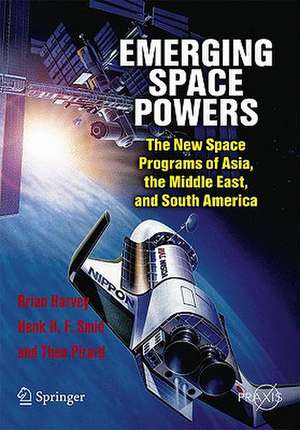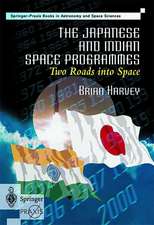Emerging Space Powers: The New Space Programs of Asia, the Middle East and South-America: Springer Praxis Books
Autor Brian Harvey, Henk H. F. Smid, Theo Pirarden Limba Engleză Paperback – 19 mar 2010
Brian Harvey describes the origins of the Japanese space program, from rocket designs based on WW II German U-boats to tiny solid fuel 'pencil' rockets, which led to the launch of the first Japanese satellite in 1970. The next two chapters relate how Japan expanded its space program, developing small satellites into astronomical observatories and sending missions to the Moon, Mars, comet Halley, and asteroids.
Chapter 4 describes how India's Vikram Sarabhai developed a sounding rocket program in the 1960s. The following chapter describes the expansion of the Indian space program. Chapter 6 relates how the Indian space program is looking ahead to the success of the moon probe Chandrayan, due to launch in 2008, and its first manned launching in 2014. Chapters 7, 8, and 9 demonstrate how, in Iran, communications and remote sensing drive space technology.
Chapter 10 outlines Brazil's road to space, begun in the mid-1960's with the launch of the Sonda sounding rockets. The following two chapters describe Brazil's satellites and space launch systems and plans for the future. Chapters 13 and 14 study Israel's space industry. The next chapters look at the burgeoning space programs of North and South Korea.
The book ends by contrasting and comparing all the space programs and speculating how they may evolve in the future. An appendix lists all launches and launch attempts to date of the emerging space powers.
Din seria Springer Praxis Books
-
 Preț: 294.46 lei
Preț: 294.46 lei -
 Preț: 223.45 lei
Preț: 223.45 lei -
 Preț: 193.12 lei
Preț: 193.12 lei -
 Preț: 167.85 lei
Preț: 167.85 lei -
 Preț: 288.98 lei
Preț: 288.98 lei -
 Preț: 323.74 lei
Preț: 323.74 lei -
 Preț: 401.38 lei
Preț: 401.38 lei -
 Preț: 264.12 lei
Preț: 264.12 lei - 8%
 Preț: 513.00 lei
Preț: 513.00 lei -
 Preț: 190.01 lei
Preț: 190.01 lei -
 Preț: 218.16 lei
Preț: 218.16 lei -
 Preț: 312.06 lei
Preț: 312.06 lei - 17%
 Preț: 414.05 lei
Preț: 414.05 lei -
 Preț: 216.41 lei
Preț: 216.41 lei -
 Preț: 262.27 lei
Preț: 262.27 lei -
 Preț: 264.35 lei
Preț: 264.35 lei -
 Preț: 167.63 lei
Preț: 167.63 lei -
 Preț: 284.81 lei
Preț: 284.81 lei -
 Preț: 259.08 lei
Preț: 259.08 lei -
 Preț: 305.47 lei
Preț: 305.47 lei -
 Preț: 244.14 lei
Preț: 244.14 lei -
 Preț: 227.85 lei
Preț: 227.85 lei -
 Preț: 285.25 lei
Preț: 285.25 lei -
 Preț: 295.56 lei
Preț: 295.56 lei -
 Preț: 357.17 lei
Preț: 357.17 lei -
 Preț: 275.79 lei
Preț: 275.79 lei -
 Preț: 257.08 lei
Preț: 257.08 lei -
 Preț: 349.71 lei
Preț: 349.71 lei -
 Preț: 272.45 lei
Preț: 272.45 lei -
 Preț: 270.27 lei
Preț: 270.27 lei - 8%
 Preț: 456.51 lei
Preț: 456.51 lei -
 Preț: 352.34 lei
Preț: 352.34 lei - 8%
 Preț: 394.80 lei
Preț: 394.80 lei -
 Preț: 320.65 lei
Preț: 320.65 lei -
 Preț: 325.29 lei
Preț: 325.29 lei -
 Preț: 253.11 lei
Preț: 253.11 lei -
 Preț: 192.86 lei
Preț: 192.86 lei -
 Preț: 313.40 lei
Preț: 313.40 lei -
 Preț: 150.51 lei
Preț: 150.51 lei -
 Preț: 233.34 lei
Preț: 233.34 lei -
 Preț: 286.78 lei
Preț: 286.78 lei -
 Preț: 212.01 lei
Preț: 212.01 lei -
 Preț: 366.83 lei
Preț: 366.83 lei -
 Preț: 299.99 lei
Preț: 299.99 lei -
 Preț: 232.27 lei
Preț: 232.27 lei -
 Preț: 284.58 lei
Preț: 284.58 lei -
 Preț: 212.45 lei
Preț: 212.45 lei -
 Preț: 159.81 lei
Preț: 159.81 lei -
 Preț: 349.48 lei
Preț: 349.48 lei - 20%
 Preț: 2061.64 lei
Preț: 2061.64 lei
Preț: 342.89 lei
Nou
Puncte Express: 514
Preț estimativ în valută:
65.63€ • 71.32$ • 55.17£
65.63€ • 71.32$ • 55.17£
Carte disponibilă
Livrare economică 31 martie-14 aprilie
Preluare comenzi: 021 569.72.76
Specificații
ISBN-13: 9781441908735
ISBN-10: 1441908730
Pagini: 400
Ilustrații: 732 p. 100 illus.
Dimensiuni: 155 x 235 x 35 mm
Greutate: 1.23 kg
Ediția:2010
Editura: Praxis
Colecția Praxis
Seriile Springer Praxis Books, Space Exploration
Locul publicării:New York, NY, United States
ISBN-10: 1441908730
Pagini: 400
Ilustrații: 732 p. 100 illus.
Dimensiuni: 155 x 235 x 35 mm
Greutate: 1.23 kg
Ediția:2010
Editura: Praxis
Colecția Praxis
Seriile Springer Praxis Books, Space Exploration
Locul publicării:New York, NY, United States
Public țintă
Popular/generalCuprins
Japan: Origins - the legacy of Hideo Itokawa.- Japan: Into the solar system.- Japan: Kibo and the Space Station.- India: The vision of Vikram Sarabhai.- India: Space technology and the villages.- India: Manned and lunar flight.- Iran: Origins - the road to space.- Iran: Development - space launch systems and satellites.- Brazil: Origins - the road to space.- Brazil: Development - space launch systems, space probes and satellites.- Brazil: Plans - the ultimate goal.- Israel: Small but efficient actor in space.- North Korea: The most secret country in space.- South Korea: New entrant for space systems.- Contrasts and comparisons.
Recenzii
From the reviews:
“Emerging Space Powers … discuss the space programs in Japan, India, Iran, Brazil, Israel, and North and South Korea. … Five appendixes provide a helpful list of launches for the nations discussed, a very good descriptive list of the space institutes in Iran … and a list of UN space treaties. … competently done and will interest those who want to learn about the history, technology, and potential of the space programs in these countries. Summing Up: Recommended. Upper-division undergraduates, general readers, and professionals.” (A. M. Strauss, Choice, Vol. 48 (1), September, 2010)
“In the 1950s and 60s, space activities were dominated by the two superpowers, the United States and the Soviet Union. … Towards the end of the 20th Century and in the first decade of the current century, new players arrived on the scene, notably India, Korea … Brazil, Israel, and Iran. These up-and-coming space powers are the subject of this comprehensive account. Well illustrated throughout, this hefty tome is a valuable one-stop reference for the status of the programmes in emerging space nations … .” (Peter Bond, The Observatory, Vol. 131 (1221), April, 2011)
“Emerging Space Powers … discuss the space programs in Japan, India, Iran, Brazil, Israel, and North and South Korea. … Five appendixes provide a helpful list of launches for the nations discussed, a very good descriptive list of the space institutes in Iran … and a list of UN space treaties. … competently done and will interest those who want to learn about the history, technology, and potential of the space programs in these countries. Summing Up: Recommended. Upper-division undergraduates, general readers, and professionals.” (A. M. Strauss, Choice, Vol. 48 (1), September, 2010)
“In the 1950s and 60s, space activities were dominated by the two superpowers, the United States and the Soviet Union. … Towards the end of the 20th Century and in the first decade of the current century, new players arrived on the scene, notably India, Korea … Brazil, Israel, and Iran. These up-and-coming space powers are the subject of this comprehensive account. Well illustrated throughout, this hefty tome is a valuable one-stop reference for the status of the programmes in emerging space nations … .” (Peter Bond, The Observatory, Vol. 131 (1221), April, 2011)
Caracteristici
Introduces the origins and current status of the lesser known, yet still important, space programs of emerging countries such as Iran and Brazil Includes important developments of the space programs of Japan and India from 1999 to 2007 Speculates on the future plans of emerging space powers and their impact on space leaders
















